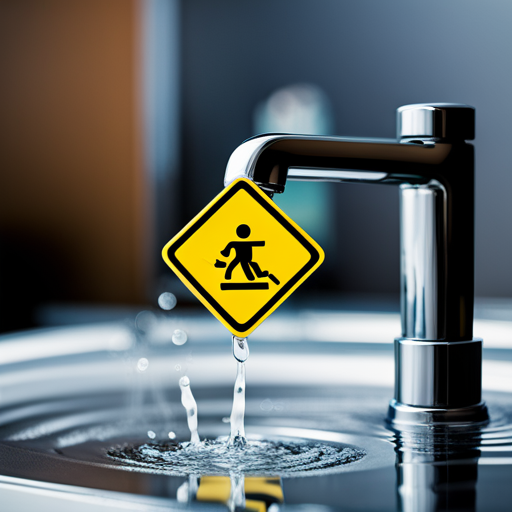Are you concerned about the safety of washing your clothes with water that contains PFAS? Per- and polyfluoroalkyl substances (PFAS) are man-made chemicals that have been used in many products for decades. Exposure to PFAS can lead to adverse health effects, with contaminated water and food being the most common sources of exposure.
While washing clothes in water with PFAS is not considered a significant health risk, many people are still worried about the potential for absorption through the skin. It’s important to understand the risks and take precautions to reduce exposure to these harmful chemicals.
In this article, we will explore whether washing clothes with water that has PFAS in it is safe or risky, as well as provide tips on how to reduce exposure to PFAS in your everyday life. So let’s dive in and find out more about this topic.
Key Takeaways
– PFAS are man-made chemicals that can harm human health and cause adverse effects.
– Washing clothes in water containing PFAS is not a significant health risk, and the risk of PFAS on clothes being absorbed through the skin is very low.
– Cooking, washing dishes, and bathing with PFAS-containing water are considered safe.
– To protect yourself, avoid purchasing water-, grease-, and stain-resistant clothes, and install a treatment system like reverse osmosis or carbon filters to remove PFAS from contaminated water.
PFAS Overview
You already know that PFAS are man-made chemicals that can harm human health and are found in various products, but it’s important to understand the specifics of PFAS and their potential risks.
PFAS, or per- and polyfluoroalkyl substances, are a group of chemicals that have been used in products since the 1940s. They are found in items such as food packaging, non-stick cookware, and firefighting foam.
PFAS have been linked to various health risks such as cancer, liver damage, and hormonal disruptions. Additionally, they have a significant environmental impact as they are persistent and do not break down easily in the environment.
It’s important to be aware of the sources of PFAS exposure and take steps to minimize it. While washing clothes in water containing PFAS is not a significant health risk, it’s crucial to consider other sources of exposure such as drinking contaminated water and eating contaminated food. The use of PFAS in household products and electronics manufacturing also contributes to exposure.
To minimize exposure, it’s recommended to install a treatment system to remove PFAS from contaminated water and to avoid purchasing water-, grease-, and stain-resistant clothes.
Sources of Exposure
Children are more vulnerable to the harmful effects of PFAS exposure compared to adults, which can occur through ingesting contaminated food or water, or through exposure in the workplace. However, it’s important to note that washing clothes in water containing PFAS is not considered a significant health risk.
The risk of PFAS on clothes being absorbed through the skin is very low, and there are no known adverse health effects associated with washing clothes with PFAS-contaminated water.
To minimize exposure to PFAS, it’s important to take preventive measures such as avoiding purchasing water-, grease-, and stain-resistant clothes. Fresh fruits and vegetables should be eaten to reduce exposure, while processed foods should be avoided.
Installing a treatment system like reverse osmosis or carbon filters can remove PFAS from contaminated water. Testing water for PFAS contamination using home test kits or state-certified laboratories is also recommended.
Educating yourself about PFAS and taking steps to protect yourself and your family can help prevent the negative health effects associated with PFAS exposure.
Precautions and Solutions
Take preventive measures to reduce your exposure to PFAS by avoiding purchasing products that are labeled as water-, grease-, and stain-resistant. This includes clothes, carpets, and furniture. Instead, opt for natural fibers like cotton, wool, and silk that don’t require PFAS treatments.
If you must buy stain-resistant products, look for those labeled as PFAS-free or made with alternative treatments like nano-technology.
To further reduce your exposure to PFAS, install a water treatment system like reverse osmosis or carbon filters. These systems can remove PFAS from contaminated water and provide clean drinking water for you and your family.
It’s also recommended to test your water for PFAS contamination using home test kits or state-certified laboratories.
Additionally, consider reducing your use of products like non-stick cookware and cleaning products that contain PFAS. By taking these precautions and exploring alternative solutions, you can protect yourself and your family from the harmful effects of PFAS exposure.
Conclusion
So, is washing your clothes in water that contains PFAS safe or risky? The short answer is that it’s unlikely to pose a significant health risk.
While exposure to PFAS can lead to adverse health effects, such as decreased fertility and increased risk of cancer, the amount of PFAS that could potentially be absorbed through the skin from washing clothes in contaminated water is considered minimal.
However, it’s always better to err on the side of caution when it comes to your health.
If you’re concerned about exposure to PFAS, there are steps you can take to reduce your risk. This includes using a water filtration system to remove PFAS from your tap water, avoiding products that contain PFAS, and washing your clothes in cold water with a non-toxic detergent.
By taking these precautions, you can help protect yourself and your family from the harmful effects of PFAS.
